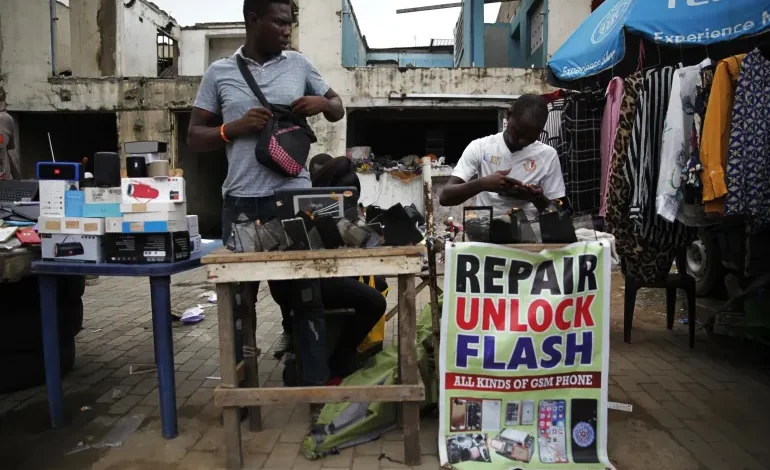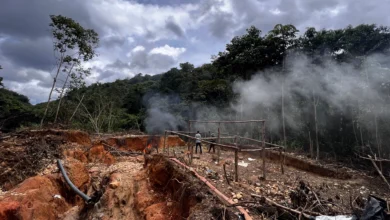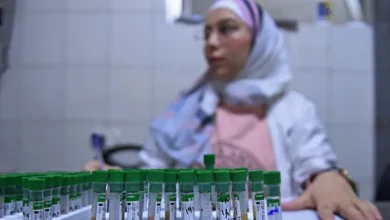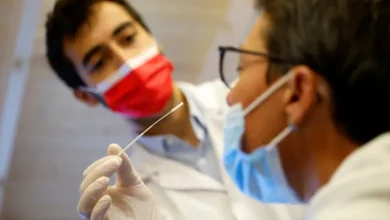Want status in Nigeria? An informal iPhone market offers dreams and despair

Kola Alawada shelters from the rain beneath the shade of a phone accessories kiosk in Computer Village in Lagos, his old Android phone with a cracked screen clutched in his hand.
The sprawling, chaotic marketplace in southwestern Nigeria is Africa’s largest technology hub, where streets lined with shopping plazas and informal stalls sell and repair a plethora of devices across a range of price points.While entry-level Androids sell for as low as 25,500 naira ($15), even older model, second-hand iPhones are pricier – a used iPhone 8 Plus, for instance, can cost about 150,000 naira ($88), despite its outdated iOS.While entry-level Androids sell for as low as 25,500 naira ($15), even older model, second-hand iPhones are pricier – a used iPhone 8 Plus, for instance, can cost about 150,000 naira ($88), despite its outdated iOS.
So, many like Alawada find alternative means of securing an iPhone.
At Computer Village, he is on a mission to sell his old Android, add the money to his pot of savings and use it to buy an iPhone.
As James continues his back and forth with the other customer over WhatsApp, Alawada waits, wondering if his father had bought his Android here. He remembers the thrill of unboxing the Tecno Phantom X in 2021 at the start of university – a family investment of more than 200,000 naira ($118).
Finally off the phone, the 35-year-old reseller inspects Alawada’s Android and shakes his head. “No one will buy this for a good price,” James says bluntly. “Androids don’t hold second-hand value.” He hands the phone back, and Alawada’s face briefly falls.
The student feels his plan slipping away in the rain-soaked chaos, but the disappointment does not sway him.
Flawless fixer
The global iPhone vs Android battle has raged for 17 years, with Android commanding about 70 percent of the market and iPhone holding 28 percent. That market divide holds in Nigeria too, but for many millennial and Gen Z users, phones are about more than just functionality.
Young Nigerians say the iPhone’s exclusivity and operating system give it a unique prestige. Apps popular with Gen Z, like Snapchat and Instagram, perform better on iPhones, due to the seamless integration with its camera, they say. The airdrop feature also makes it easy to share files within their network.
Still determined to get his hands on an iPhone, Alawada accompanies James through the labyrinth of Computer Village. Frenzied and fast-paced, the tech market snakes through seven streets – a cacophony of low-rise buildings, repurposed bungalows and iron-clad kiosks through alleys.
Its streets teem with umbrellas and clusters of traders. Idle cars serve as backdrops for fashion stalls, while food vendors weave through, feeding the bustling crowd.
Damp from the rain, James and Alawada finally reach a busy shop belonging to Solomon Dosumu.
Many of these phones arrive from China in bulk, usually with minor defects – no Face ID, cracked back glass – and are shipped to repairmen like Dosumu in Nigeria. Once fixed, they’re resold.
Some are brand-new devices swapped by people eager to upgrade, while in rare cases, stolen phones are resold after victims are forced to log out of their iCloud accounts during a robbery.
Simple to complex repairs
Finally, Dosumu returns to the shop, flanked by two men carrying iPhone parts. One, a screwdriver between his teeth, briefly blocks Alawada’s view of the LED-strewn stands. There sits the Sierra Blue 12 Pro he has been eyeing, and Alawada’s anticipation heightens.
As an “engineer’s engineer”, Dosumu, 37, is accustomed to assisting fellow technicians. He began his journey years ago as an apprentice, fixing smartphones after leaving his petrol station job in search of something more stable – around the time the first iPhone was launched.
“I’ve always loved technology – phones, gadgets, all that. That passion made phone repairs an easy choice,” Dosumu says while working on the iPhone 11 Pro. “I came to Computer Village, met someone who fixed my phone, told him I wanted to learn, paid him for six months and enrolled. I ended up spending a year there.”
When Dosumu began his career in 2009, the iPhone 3GS was largely ignored in Nigeria, with even less interest in the iPhone 4 the following year. Blackberry dominated the market.
Now, Dosumu charges aspiring iPhone engineers 150,000 naira ($90) for six months of training, much of which he admits to learning from YouTube.
Dosumu’s journey to mastery has been filled with challenges, with dismantled phones as evidence of his struggles. “Screens are the easiest,” he says. “But more complex repairs – like the iPhone’s True-Depth Face ID or battery replacements – have cost me time, money and plenty of batteries. It’s not as simple as swapping out AA batteries,” he adds with a wry smile.
“When you replace parts, the phone displays Apple’s “unknown parts” message, and some features, like battery health, stop working,” Dosumu explains. “To fix that, I had to invest in specialised tools.” Among these are devices like the JCID Romeo Face ID Chip and the JCID Q1 iPhone Battery Health Repair Board, essential tools for bypassing Apple’s limitations and restoring full functionality.
It has been worth it. Thanks to the demand for used and repaired iPhones, Dosumu can support himself, provide for his family and keep up with his rent.
He picks up two small motherboards, each barely an inch wide, marked with model numbers ranging from the iPhone 6 to the 15 Pro Max. “These”, he explains, “are crucial for resetting batteries, recalibrating cameras and clearing error messages” – indispensable tools for navigating Apple’s strict repair protocols.










